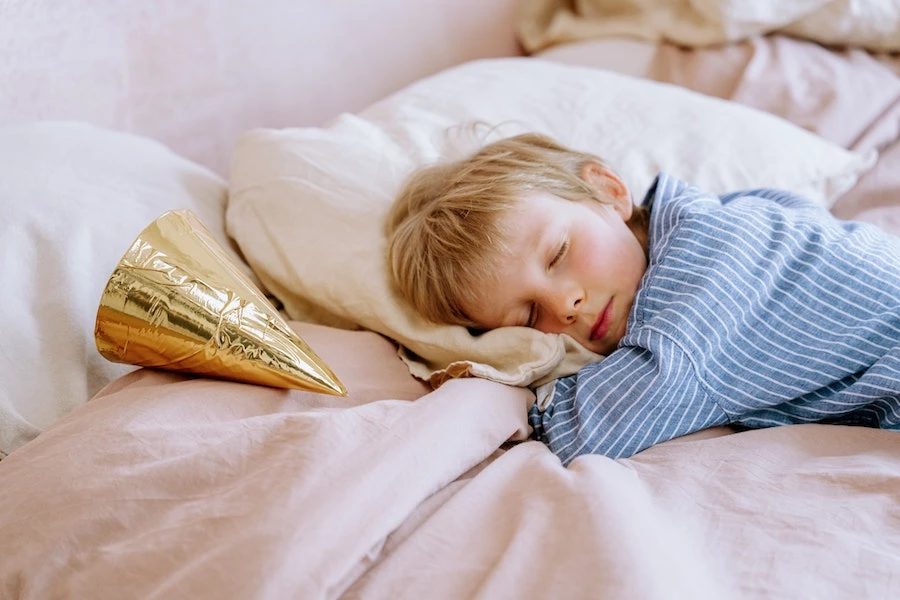
Sleep is such a crucial component of a person’s health journey at any age – but for children, getting proper sleep is even more critical.
Sleep not only helps busy kids recharge and stay focused for school, it helps their brains develop in a healthy way that will support their growth. If your child isn’t sleeping properly, you may notice a change in their behavior and moods – for instance, sleep-deprived children are typically less social, may struggle to stay focused in school or complete schoolwork, or may even show hyperactive tendencies.
Luckily, there are a number of natural sleep remedies for children that you can try out if behavioral and lifestyle changes aren’t helping them enough. From sleep patches to special melatonin gummies, there are plenty of options available to fit your child’s needs and preferences and help them get the good night’s sleep they deserve (and need!).
1. Choose The Right Ingredients
There are certain ingredients and herbs that may help your child relax before bed and set them up for a better night’s sleep. Chamomile is a popular option that helps people of all ages relax and wind down. If your child won’t consume hot tea, find a cold tea that includes chamomile or look for a healthy baked good that has some in it.
California Poppy is also a popular sleep aid that can be found in teas and herbal drinks.
If your child is unlikely to consume any of these herbs, you can still use their nutrition as a way to support them by ensuring you avoid giving them excessive sugars or salts before bed.
2. Try Specific Vitamins And Supplements
The use of melatonin as a sleep aid for both children and adults seems to have become so much more prevalent in recent years, and for good reason – melatonin is naturally produced by the body when it’s time to sleep, and increasing the amount of it running through our body can be a surefire way to get us to sleep quickly and deeply.
You can also find melatonin gummies, drinks and treats that are made especially for kids to help them wind down and feel sleepy before bed. Unless your child has a chronic sleep issue, though, it’s not usually recommended to give them melatonin every single night.
In addition to melatonin, there are many other vitamins that can help your child sleep better. Magnesium is known to be an amazing sleep aid and anxiety reducer, so making sure your child is getting enough of it is truly essential. If they’re not getting it through their diet and aren’t good at taking vitamins, there are companies now that make magnesium sprays and wipes.
Be sure to talk with your child’s pediatrician before starting them on a magnesium supplement, as giving them too high of a dose can cause symptoms like abdominal cramping, low blood pressure or diarrhea.
3. Essential Oils
The biggest key to helping your child sleep better is figuring out how you can get them to fully relax their mind and body so they don’t feel the urge to get out of bed, toss and turn, or try to argue for a later bedtime.
Many parents find that having essential oils around the home can help soothe kids enough to help them wind down and feel calm before bedtime (the bonus is that parents can benefit from these soothing scents just as much).
Lavender is probably the most popular essential oil used for relaxation, anxiety relief and creating a restful environment. Invest in a nice essential oil diffuser for your living room, bathroom, or your kid’s room so they can reap the soothing benefits of the lavender scent while they’re getting ready for bed and winding down for the night. You may even be able to find special stuffed animals that are specifically created with essential oils that help kids snuggle up.
4. White Noise Machines
Some kids may find that the number one thing keeping them awake at night is the fact that hearing outside sounds keeps them from falling asleep, thus making them frustrated or uncomfortable.
White noise machines and apps are a tremendous remedy for kids who need noise reduction in order to get a good night’s sleep. Many white noise machines come with a number of different settings that you can experiment with until your child finds a sound they like.
5. Optimize Their Bedtime Routine
One of the easiest ways to ensure your child gets a better night’s sleep is to optimize their bedtime routine to be as relaxing and quiet as possible. Even though they might argue about this part for a while, that means you’ll need to limit the amount of time they spend on electronics before bed – in fact, experts recommend parents shut off their kids’ electronics at least two hours before bed.
Helping your child establish healthy sleep habits when they’re young will set them up for stronger, healthier and more energized lifestyles well into adulthood.








